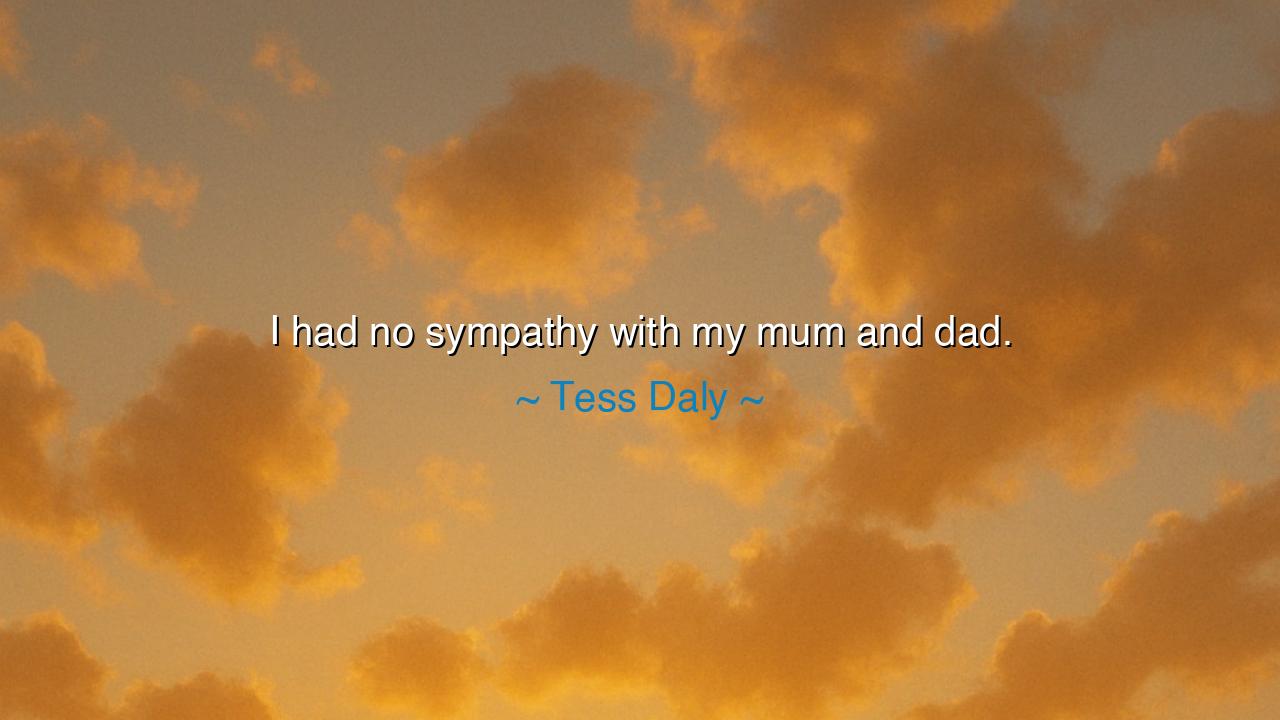
I had no sympathy with my mum and dad.






Hear, O seekers of reflection, the stark and unvarnished words of Tess Daly: “I had no sympathy with my mum and dad.” At first hearing, these words may seem harsh, as though they were daggers thrown against the very pillars of family. Yet look deeper, and you will find not malice, but the awakening of honesty—a truth many souls wrestle with in silence. For childhood and youth are times when hearts burn with independence, when judgment is swift, and when the flaws of parents loom larger than their sacrifices.
To have no sympathy is to confess that, in a moment of life, one could not place oneself within the struggles of another. Children often see their parents as immovable mountains, demanding, unyielding, perhaps misunderstood. They do not yet know the weight that mothers and fathers carry: the chains of responsibility, the sleepless nights, the silent sacrifices. Tess Daly’s words may echo a youthful distance, a time before understanding ripened, a time before she looked back and saw the humanity of her parents, fragile and striving like all others.
The ancients tell us that such disconnection is part of the great cycle of life. Consider the tale of King Lear, who gave his kingdom to his daughters, hoping for love in return. Instead, he found scorn and ingratitude. His children did not see the years of toil that made his crown heavy, nor the wounds of age that weakened his strength. Only too late did they, and Lear himself, recognize the deep tragedy of misjudging one another. To lack sympathy for parents is not new; it is as old as humanity itself, for understanding ripens only when we, too, take on burdens of our own.
Yet there are other stories—shining in contrast—where sympathy bridged the generations. Recall the young Alexander the Great, who though fierce in conquest, knelt always to honor Olympias, his mother, and remembered the lessons of Philip, his father. His victories were not his alone; they were the flowering of roots laid down before him. In his story, we see the opposite truth: that to feel sympathy for one’s parents is to recognize that greatness is never self-born, but inherited, nurtured, and guided.
Thus, Tess Daly’s words, though spoken with starkness, call us to a profound lesson: do not wait too long to understand your parents. They, too, are human. They stumble, they err, they falter, yet beneath it all lies a love that labored for your existence. If sympathy fails in youth, let it grow in maturity. For one day, you will see in their faces the struggles you yourself have faced, and you will understand that they were not gods to judge, but mortals to love.
In your own life, therefore, practice this wisdom: when anger rises toward your parents, pause and imagine the hidden battles they fought. When you feel distance, remember that they, too, were once young, uncertain, and full of dreams like you. Seek conversations, ask about their past, listen to their stories. For in those stories you will find both the roots of your life and the keys to compassion.
And let this be the enduring flame: sympathy is the bridge that turns distance into understanding, and judgment into love. Tess Daly’s admission may sound severe, but it is a mirror in which we all glimpse our own youthful pride. Let it move you not to condemnation, but to action—to honor your parents while they still walk beside you, and to carry forward their legacy with gratitude, not regret.
For in the end, the greatest triumph is not to stand apart from those who raised us, but to look back with eyes of mercy and say: I see you now, I understand, and my heart holds you with sympathy at last.






AAdministratorAdministrator
Welcome, honored guests. Please leave a comment, we will respond soon